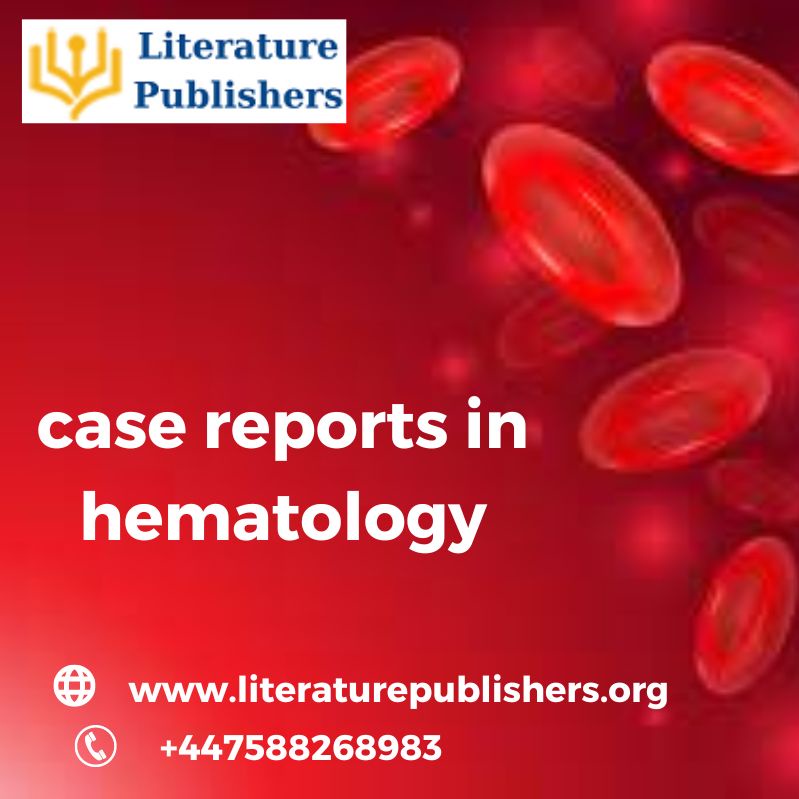Case reports are a critical aspect of medical research, and their value cannot be overstated. In the field of hematology, case reports are essential to improving our understanding of hematological disorders, identifying rare or unusual cases, and providing insights into treatment outcomes. These reports offer detailed information on individual patients, including their medical history, diagnostic tests, treatment approaches, and long-term outcomes.
Hematological disorders are complex conditions that can be challenging to diagnose and treat effectively. These disorders include a wide range of conditions, such as bleeding and clotting disorders, anemia, and blood cancers. Each case is unique, and healthcare providers must be able to recognize the subtle differences between similar disorders to provide the best possible care.
Case reports in hematology can help healthcare providers to improve their diagnostic accuracy and treatment approaches. These reports provide detailed information on individual patients, allowing clinicians to understand the unique features of each case. By examining a range of case reports, healthcare providers can identify patterns or trends in the presentation, diagnosis, and treatment of hematological disorders.
Case reports can also be a valuable resource for patients and their families. Hematological disorders can be difficult to understand and manage, and case reports can provide a sense of hope and inspiration. These reports can help patients and their families to learn about the experiences of others who have faced similar challenges, and can offer insights into treatment approaches and outcomes.
One of the significant benefits of case reports in hematology is their ability to provide insights into rare or unusual cases. Many hematological disorders are relatively rare, and it can be challenging for healthcare providers to recognize these conditions. Case reports offer a detailed description of individual patients, including their medical history, diagnostic tests, and treatment approaches.
For example, a case report might describe a patient with a rare genetic disorder called hereditary spherocytosis. This disorder is characterized by the presence of abnormally shaped red blood cells, which can lead to anemia, jaundice, and an increased risk of gallstones. The case report might describe how the patient was diagnosed, the treatments that were tried, and the long-term outcomes. This information can be invaluable to other healthcare providers who may encounter similar cases in their own practice.
Case reports can also provide insights into treatment outcomes. Hematological disorders can be challenging to treat, and different patients may respond differently to various treatments. Case reports can offer information on the effectiveness of different treatments, as well as any adverse effects that may occur.
For example, a case report might describe a patient with acute myeloid leukemia who was treated with chemotherapy. The report might describe how the patient responded to treatment, any adverse effects that occurred, and the patient's long-term outcomes. This information can be useful for healthcare providers who are considering similar treatment approaches for their own patients.
Case reports can also be a source of inspiration for healthcare providers and patients alike. Many hematological disorders can be difficult to manage and may have a significant impact on a patient's quality of life. Case reports can share stories of successful treatments and recoveries, providing hope and inspiration to patients and their families.
In addition to their value to healthcare providers and patients, case reports in hematology can also be a valuable resource for researchers. Case reports can provide a starting point for future research, highlighting potential areas for investigation and identifying gaps in our current understanding of hematological disorders.
For example, a study of case reports of patients with hemophilia might identify commonalities in the presentation and treatment of the disorder. This information could then be used to develop new treatment approaches or identify areas for further investigation.
Overall, case reports in hematology play a critical role in advancing our understanding of these complex disorders, improving patient care, and inspiring hope for patients and their families. As the field of hematology continues to evolve, case reports will
Contact : +447588268983
Visit :https://www.literaturepublishers.org/journal/case-reports-in-hematology.html


No comments yet